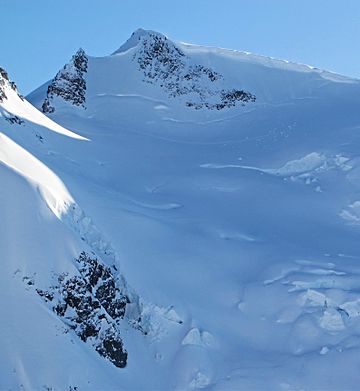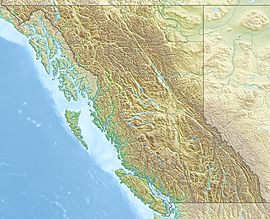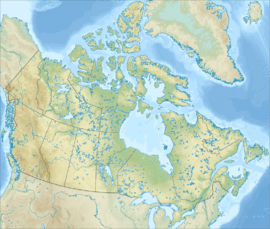Mount Benvolio facts for kids
Quick facts for kids Mount Benvolio |
|
|---|---|

Mount Benvolio, north aspect
|
|
| Highest point | |
| Elevation | 2,613 m (8,573 ft) |
| Prominence | 73 m (240 ft) |
| Parent peak | Overlord Mountain (2625 m) |
| Listing | Mountains of British Columbia |
| Geography | |
| Location | Garibaldi Provincial Park British Columbia, Canada |
| Parent range | Fitzsimmons Range Garibaldi Ranges Coast Ranges |
| Topo map | NTS 92J/02 |
| Climbing | |
| First ascent | 1924 by BCMC party |
| Easiest route | class 2 via Benvolio Glacier |
Mount Benvolio is a tall mountain in British Columbia, Canada. It stands about 2,613 meters (8,573 feet) high and is covered in glaciers. You can find it in Garibaldi Provincial Park, which is part of the Coast Mountains.
This peak is the second tallest point in the Fitzsimmons Range, a smaller part of the Garibaldi Mountains. Mount Benvolio is about 15 kilometers (9 miles) southeast of Whistler. Its closest and taller neighbor is Overlord Mountain, just 0.7 kilometers (0.4 miles) away to the northwest.
Three main glaciers are found on Mount Benvolio. The Benvolio Glacier is on the western side, the Diavolo Glacier spreads out on the eastern side, and the Fitzsimmons Glacier flows down the northern slope. Water from the melting glaciers and rain flows into streams that feed the Cheakamus River.
How Mount Benvolio Got Its Name
The first time someone successfully climbed Mount Benvolio was in 1923. This amazing feat was achieved by Phyllis Munday and Don Munday, who climbed up using the Benvolio Glacier.
The mountain was officially named in 1964 by a group of climbers from the Alpine Club of Canada. They chose the name to celebrate the 400th birthday of the famous writer William Shakespeare. If you look at the mountain from the north, it stands out between Overlord Mountain and Mount Fitzsimmons.
The name "Benvolio" comes from a character in Shakespeare's play Romeo and Juliet. This character shared similar good qualities with the mountain. The name was officially accepted by the Geographical Names Board of Canada on August 27, 1965.
Weather and Climate Around Mount Benvolio
Mount Benvolio is located in a place with a "marine west coast" climate. This means it gets a lot of moisture from the Pacific Ocean. Most weather systems come from the Pacific and move east towards the Coast Mountains.
When these weather systems hit the mountains, they are forced to rise. This causes them to drop their moisture as rain or snow. Because of this, the Coast Mountains get a lot of precipitation, especially heavy snowfall in winter.
Temperatures on the mountain can drop very low, sometimes below −20 °C (–4 °F). With the wind chill, it can feel even colder, below −30 °C (–22 °F). The best time to climb Mount Benvolio is usually from July through September, when the weather is most favorable.
Images for kids
 | George Robert Carruthers |
 | Patricia Bath |
 | Jan Ernst Matzeliger |
 | Alexander Miles |




